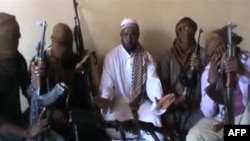ABUJA —
Nigerian security forces said they have killed Boko Haram's second-in-command and his father, who they accuse of indoctrinating child soldiers for the Islamist militant group. Security forces cannot agree on where or how he was killed.
Nigerian security forces in Adamawa State on Tuesday announced that they killed Abubakar Zakaria Ya’u and Muhammed Bama in a gunfight. Both men, they said, were wanted leaders of the militant group known as Boko Haram.
But on Thursday, in a press conference in the city of Maiduguri, the original home of Boko Haram, Lt. Col. Sagir Musa said Momodu Bama - the local way of saying Muhammed Bama - was not killed in Adamawa, but in Borno state.
2009
2010
2011
2012
2013
He said Bama was second only to Boko Haram’s leader, Abubakar Shekau, and calls him a "vicious and heartless" killer who planned "terrorist" operations. He added that Bama was killed alongside his father, Abatcha Flatari, when Boko Haram members attacked a military base in the town of Bama. Nearly 55 police and soldiers were killed in a battle at the same base in early May.
A week after that attack Nigerian President Goodluck Jonathan declared a state of emergency in Borno, Adamawa and Yobe States and sent thousands of troops on the offensive. Since then the military says it has killed or arrested hundreds of Boko Haram members and reclaimed formerly occupied lands.
But as Elizabeth Donnelly of the Africa Program at the London-based policy institute Chatham House sayid it’s hard to know who’s really winning.
The Boko Haram leadership structure is also unclear, she said, with some people claiming to be leaders only later to be denounced by Shekau, who portrays himself as the top leader.
“In terms of how decision-making within that group plays out, in terms of actually defining its own motivations and its own end game, it’s not clear how that happens within the group. It would certainly being the case that Shekau is a figurehead in the least,” added Donnelly.
Borno State officials say Flatari, Bama’s father, was also killed in the battle at the military base. They say Flatari was one of the group's "spiritual mentors" and accuse him of teaching kidnapped children violent extremism.
In nearly four years of insurgency, Boko Haram has been blamed for thousands of deaths in attacks on churches, mosques, schools, media houses, government buildings, banks and the local U.N. headquarters. Rights groups said security forces have also killed hundreds of people in their fight with Boko Haram and that they are often likely to shoot somebody before making an arrest.
Abdulkareem Haruna contributed to this report from Maiduguri.
Nigerian security forces in Adamawa State on Tuesday announced that they killed Abubakar Zakaria Ya’u and Muhammed Bama in a gunfight. Both men, they said, were wanted leaders of the militant group known as Boko Haram.
But on Thursday, in a press conference in the city of Maiduguri, the original home of Boko Haram, Lt. Col. Sagir Musa said Momodu Bama - the local way of saying Muhammed Bama - was not killed in Adamawa, but in Borno state.
Boko Haram
Major attacks blamed on Nigeria's Boko Haram2009
- July - Attacks prompt government crackdown in Bauchi and Maiduguri; 800 people killed
2010
- December - Bombings in central Nigeria and church attacks in the northeast kill 86
2011
- June - Attack on a bar in Maiduguri kills 25
- August - Suicide bomber kills 23 at U.N. building in Abuja
- November - Bombings in Damaturu and Potiskum kill 65
- December - Christmas Day bombings across Nigeria kill 39
2012
- January -- Gun and bomb attacks in Kano kill up to 200
- February - Maiduguri market attack kills 30
- June - Suicide car bombings at three churches kill 21
- July - Attacks in Plateau state kill dozens, including two politicians at a funeral for the victims
2013
- February - French family kidnapped in Cameroon, held hostage for two months
- April - Fighting with troops in Baga kills up to 200; residents say troops set deadly fires
- May - Attacks in Bama kill more than 50
- July - Gunmen kill 30 at a school in Yobe
- August - Gunmen kill 44 at a mosque outside Maiduguri
- September - Gunmen kill 40 students a dorm in Yobe
- October - Attack Yobe state capital Damaturu, clash with military in Borno state
A week after that attack Nigerian President Goodluck Jonathan declared a state of emergency in Borno, Adamawa and Yobe States and sent thousands of troops on the offensive. Since then the military says it has killed or arrested hundreds of Boko Haram members and reclaimed formerly occupied lands.
But as Elizabeth Donnelly of the Africa Program at the London-based policy institute Chatham House sayid it’s hard to know who’s really winning.
The Boko Haram leadership structure is also unclear, she said, with some people claiming to be leaders only later to be denounced by Shekau, who portrays himself as the top leader.
“In terms of how decision-making within that group plays out, in terms of actually defining its own motivations and its own end game, it’s not clear how that happens within the group. It would certainly being the case that Shekau is a figurehead in the least,” added Donnelly.
Borno State officials say Flatari, Bama’s father, was also killed in the battle at the military base. They say Flatari was one of the group's "spiritual mentors" and accuse him of teaching kidnapped children violent extremism.
In nearly four years of insurgency, Boko Haram has been blamed for thousands of deaths in attacks on churches, mosques, schools, media houses, government buildings, banks and the local U.N. headquarters. Rights groups said security forces have also killed hundreds of people in their fight with Boko Haram and that they are often likely to shoot somebody before making an arrest.
Abdulkareem Haruna contributed to this report from Maiduguri.
